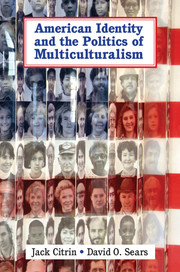Book contents
- Frontmatter
- Dedication
- Contents
- List of Figures
- List of Tables
- Preface
- Prologue
- 1 The Challenge of E Pluribus Unum
- 2 The Political Psychology of Identity Choice
- 3 Contours of American National Identity
- 4 The Ethnic Cauldron and Group Consciousness
- 5 Public Opinion and Multiculturalism’s Guiding Norms
- 6 When Do Ethnic and National Identities Collide?
- 7 Group-Conscious Policies: Ethnic Consensus and Cleavage
- 8 The Dynamics of Group-Conscious Policy Preferences
- 9 Multiculturalism and Party Politics
- 10 Conclusion
- Appendices
- Bibliography
- Index
- References
10 - Conclusion
Published online by Cambridge University Press: 05 September 2014
- Frontmatter
- Dedication
- Contents
- List of Figures
- List of Tables
- Preface
- Prologue
- 1 The Challenge of E Pluribus Unum
- 2 The Political Psychology of Identity Choice
- 3 Contours of American National Identity
- 4 The Ethnic Cauldron and Group Consciousness
- 5 Public Opinion and Multiculturalism’s Guiding Norms
- 6 When Do Ethnic and National Identities Collide?
- 7 Group-Conscious Policies: Ethnic Consensus and Cleavage
- 8 The Dynamics of Group-Conscious Policy Preferences
- 9 Multiculturalism and Party Politics
- 10 Conclusion
- Appendices
- Bibliography
- Index
- References
Summary
The catalyst for this book was the confluence of increased ethnic diversity and the rise of identity politics in the United States beginning in the mid-1960s due to the civil rights movement and immigration reform. These developments raised anew questions about the solidity of a shared American identity and the capacity to sustain a sense of social solidarity in a multiethnic polity. After years in which the racial divide defined intergroup relations in the United States, a massive and ongoing influx of Hispanic and Asian immigrants complicated the dynamics of ethnic relations in the United States by adding new modes of perception, interaction, and conflict. That the new Americans were neither white nor of European origin raised doubts about whether the historical patterns of assimilation – as promoted by the idea of the melting pot – would recur.
Our book addressed the enduring problem of e pluribus unum in this context of demographic and political change. Demography may become destiny, but only as shaped by politics and culture. In the contemporary world, the choice confronting elites was how to accommodate claims for recognition and representation by minority groups. These claims we and others group under the rubric of multiculturalism, which when viewed as an ideology represents a new approach for governing a multiethnic polity.
- Type
- Chapter
- Information
- American Identity and the Politics of Multiculturalism , pp. 261 - 284Publisher: Cambridge University PressPrint publication year: 2014

